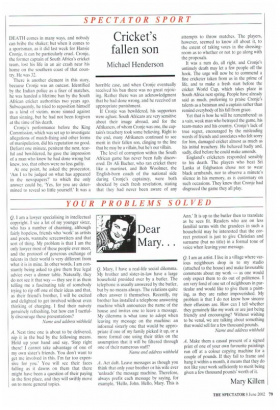Cricket's fallen son
Michael Henderson
DEATH comes in many ways, and nobody can bribe the shaker; but when it comes to a sportsman, as it did last week for Hansie Cronje, it can be particularly cruel. Cronje, the former captain of South Africa's cricket team, lost his life in an air crash near his home on the southern coast of that country. He was 32.
There is another element in this story, because Cronje was an outcast. Identified by the Indian police as a fixer of matches, he was handed a lifetime ban by the South African cricket authorities two years ago. Subsequently, he tried to reposition himself as a kind of victim, more sinned against than sinning, but he had not been forgiven at the time of his death.
Cronje's performance before the King Commission, which was set up to investigate allegations of match-fixing and other forms of manipulation, did his reputation no good. Defiant one minute, penitent the next, tearful and bewildered, he gave the impression of a man who knew he had done wrong but knew, too, that others were no less guilty.
At one point, he asked the prosecutor, 'Am I to be judged on what has appeared in the newspapers?' to which the only answer could be, 'Yes, for you are determined to reveal so little yourself.' It was a horrible case, and when Cronje eventually received his ban there was no great rejoicing. Rather there was an acknowledgment that he had done wrong, and he received an appropriate punishment.
If Cronje was bewildered, his supporters were aghast. South Africans are very sensitive about their image abroad, and for the Afrikaners, of whom Cronje was one, the captain's treachery took some believing. Right to the end, many Afrikaners continued to see merit in their fallen son, clinging to the line that he may be a villain, but he's our villain.
The level of corruption within the South African game has never been fully discovered. Dr Ali Bacher, who ran cricket there like a martinet, and Bob Woolmer, the English-born coach of the national side during Cronje's captaincy, were both shocked by each fresh revelation, stating that they had never been aware of any attempts to throw matches. The players, however, seemed to know all about it, to the extent of taking votes in the dressingroom as to whether or not to go along with the proposals.
It was a rum do, all right, and Cronje's untimely death may let a few people off the hook. The urge will now be to commend a fine cricketer taken from us in the prime of life, and to make a fresh start before the cricket World Cup, which takes place in South Africa next spring. People have already said as much, preferring to praise Cronje's talents as a batsman and a captain rather than remind everybody of his fall from grace.
Yet that is how he will be remembered: as a vain, weak man who betrayed the game, his team-mates and his country. Cronje's lack of true regret, encouraged by the misleading words of friends and associates who felt sorry for him, damaged cricket almost as much as his initial treachery. He behaved badly and, sadly, died before he could make amends.
England's cricketers responded sensibly to his death. The players who beat Sri Lanka at Edgbaston chose not to wear black armbands, nor to observe a minute's silence in his memory, as is customary on such occasions. They knew that Cronje had disgraced the game they all play.






















































































 Previous page
Previous page